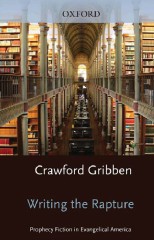
Author : Gribben Crawford
Title : Writing the Rapture Prophecy Fiction in Evangelical America
Year : 2009
Link download : Gribben_Crawford_-_Writing_the_Rapture.zip
Preface. Some things we must assign to fate. — James BeauSeigneur, In His Image (1997). Evangelical prophecy belief has been part of my life for as far back as I can remember. I grew up in an Irish family whose roots in the Plymouth Brethren movement stretched back over one hundred years. It was a family in which the material culture of the theology of the “rapture” provided the basic props of communal life. One of the objects I continue to treasure most is my grandfather’s Scofield Reference Bible (1909; second edition 1917). This was the textbook of the movement: Scofield’s eschatology was central to what it meant to be Brethren, and his “dispensationalism” was a core component of preaching in the congregations we knew best. The “official” theology was not always uncritically accepted, and the timing of the rapture was a popular subject for debate in family gatherings. But dispensationalism underpinned many of the hymns we sung and many of the books we read. I don’t remember when I first encountered evangelical prophecy fiction. I might have found an old Sydney Watson novel at my grandparents’ farm, or I might have brought one home from the shelf of stray volumes that sat in the men’s room at church. I (and other family members) have very vivid memories of watching Don Th ompson’s Th ief in the Night (1972) when I was somewhere in my mid-teens. But whenever my exposure to the genre began, prophecy fiction—and Watson’s series in particular—was an important part of the popular culture of the Brethren movement into which I was born. Perhaps it was significant, then, that prophecy fiction also defined my growing distance from this variety of evangelical faith. I discovered Left Behind sometime in the winter of 1995, some months aft er my doctoral studies began. One of my housemates had brought the novel back from his summer travels in the United States. But I was being introduced to Left Behind at precisely the moment I was leaving the Brethren movement. At the time, it seemed easy to identify the novels with all I found most objectionable about the dispensational faith. But my appreciation for these novels began to grow. Over the next twelve years, I watched their infl uence extend far beyond the subculture of our marginal Protestant movement. Rapture novels are now among the best-selling titles in the world, and their authors are now among the most successful in American literary history. Their narratives have evolved to off er a complex analysis of the dangers and opportunities of modernity, together with a hesitating apologia for isolation from it. The perspective of the Left Behind novels is, in some important senses, one I no longer share, but, over the last twelve years, I have grown in aff ection for evangelical prophecy fiction and the dispensational movement from which it first emerged and now find myself to be a generally reluctant but sometimes sympathetic fellow traveler. Much of the following narrative has a personal importance, but there are other cogent reasons to “take seriously the artefacts... that many nonevangelicals laughingly dismiss as kitsch.” Even books on eschatological themes should include a retrospective glance. I began to work on this book as a research fellow at Trinity College Dublin, continued working on it aft er my appointment to the University of Manchester, and completed it aft er my return to Trinity in September 2007. I would like to thank the many colleagues in both institutions that helped me to refl ect on this tradition. In Dublin, Darryl Jones, Amanda Piesse, and Mark Sweetnam convinced me that there was a story here worth telling, and Ian Campbell Ross graciously extended the boundaries of the Centre for Irish-Scottish Studies’ “National Literatures” project to encourage my early interests in developing this book. In Manchester, I gained a great deal in discussions with Philip Alexander, George Brooke, Jeremy Gregory, Todd Klutz, Peter Knight, Murray Pittock, Geoff Ryman, and other colleagues in literary and theological studies, with members of the Erhardt Seminar, and with my postgraduate students Jennie Chapman, Joseph Purcell, and Sarah Wareham. I would like to thank Jerome de Groot, Liam Harte, David Matthews, and Brian Ward for a particularly helpful conversation at a critical stage in the project’s development. I have appreciated the assistance of colleagues all the more as their various perspectives on prophecy fiction are oft en quite diff erent from my own. Outside these institutions, I have enjoyed cooperating on a variety of projects with Kenneth Newport and John Wallis of the Centre for Millennialism Studies at Liverpool Hope University, and with Douglas Shantz of the University of Calgary, who invited me to address the subject of evangelical prophecy fiction in the Iwaasa Lectures on Urban Theology in October 2006. My colleagues in the Brethren Archivists and Historians Network, Neil Dickson, Tordur Joannson, Michael Schneider, Timothy C. F. Stunt, and Paul Wilkinson, have generously shared their knowledge of the prophecy fiction tradition, and Ian Clary, Michael Haykin, and Randall Pederson chased down some hard-to-find references. I have been conscious that I have been reading these novels on the “wrong” side of the Atlantic and far from an established network of dispensational institutions. Douglas Cowan and Th omas Ice have been reliable guides to this oft en unfamiliar terrain. I am grateful to acknowledge the advice of Joe Walker, a Los Angeles historian, who provided vital information on the Oilar family, and Greg Wills, professor of church history at Southern Baptist Theological Seminary. I am also very grateful for the many friends and colleagues who provided valuable feedback on my earlier work on these themes. I would like to thank those who have made this publication possible. Both Jerry B. Jenkins and James BeauSeigneur consented to answer my questions about their work. I would also like to thank the staff of the Andover-Harvard Theological Library, Harvard Divinity School; Bonn University Library, especially Gabrielle Dressel; the Gamble Library, Union Theological College, Belfast, especially Stephen Gregory; the W. S. Hoole Special Collections Library, University of Alabama; the John Rylands University Library, Manchester, especially Graham Johnson, archivist of the Christian Brethren Archive; the Mugar Library, Boston University; the Pre- Trib Research Center, Liberty University, Lynchburg; the Speer Library, Princeton Theological Seminary; Trinity College Library, Dublin; and the library of Westminster College, Cambridge. Oxford University Press granted permission to reuse material that originally appeared in an essay in Literature and Theology (2004), which was developed in my short account of Rapture Fiction and the Evangelical Crisis (2006), and Baylor University Press consented to my revisiting themes that appeared in my essay in Expecting the End: Millennialism in Social and Historical Context (2006). Cynthia Read, my editor at Oxford University Press, and Daniel Gonzalez, her editorial assistant, have championed this project from its earliest stages and have overseen its improvement through helpful comments provided by Amy Johnson Frykholm and another, anonymous, reader. Of course, I alone should be held responsible for any remaining errors of fact or interpretation. Others have provided me with space and time in which to read, think, and write. As always, I owe most thanks to my family, especially Pauline, Daniel, and Mum and Dad. Soli Deo Gloria. ...

Davis James Kirkpatrick - Spying on America
Author : Davis James Kirkpatrick Title : Spying on America The FBI's domestic counter-intelligence...














